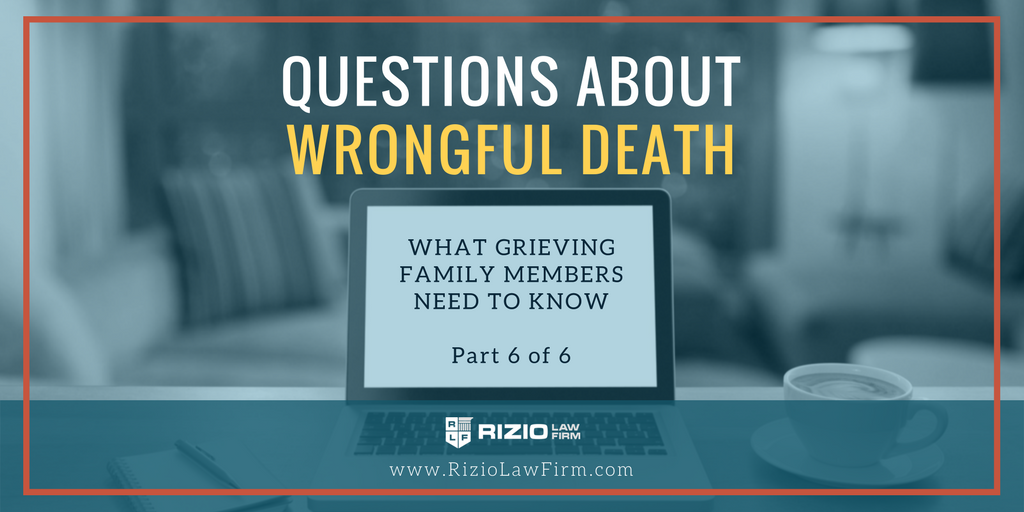Today we look at part 5 of our 6 part series on wrongful death and explore the details on how…
How Do You Prove Wrongful Death?
Today we look at the last part of our 6 part series on wrongful death. We sincerely hope that you have found this ongoing series of articles helpful in answering your questions during a difficult time.
What Determines Liability and Damages in Wrongful Death Cases?
Proving liability
The primary mandate of a wrongful death lawsuit is to show the defendant is specifically liable for the death. You and your attorney must prove:
- Duty of care: The defendant was responsible for taking care during the activity that led to the death. For example, a motorist has a duty to obey all traffic rules.
- Failure to carry out duty of care: The defendant did not take proper care. For example, a driver running a stoplight.
- Direct causation: By breaching the duty of care, the defendant caused the death. The running of the red light precipitated a fatal accident.
You must prove these allegations with evidence, witness testimony and, sometimes, expert opinion. As the plaintiff in the lawsuit, your side has the burden of proof.
Damages
Your attorney bases some of your damages on the bills you have already received related to your loved one’s demise. However, it is more difficult to accurately calculate future damages you will suffer as a result of the wrongful death. Some things to consider include:
- The value of lost future earnings based on current economic values, taking inflation and other financial variables into account
- The probable life expectancy/earning potential of the decedent
- The future value of retirement funds or pensions if the decedent had survived
- The cost of replacing goods and services the decedent provided, such as home maintenance, auto maintenance, childcare, garden care, or financial management
- The value of the loss of such intangibles as companionship, love, parental guidance, and emotional support
If you are an heir or executor of the decedent’s estate, some of the damages you seek might include:
- Loss of the income that the decedent would have earned at the average life expectancy, minus the average cost of living during that time
- Total losses of all beneficiaries of the estate due to the untimely death
Calculating damages can be very complex, calling for the help of financial professionals. Your wrongful death attorney can suggest appropriate resources.
Several factors influence the amount of compensation you can receive in a wrongful death case:
- The number of claimants/dependents involved in the lawsuit
- The jury’s assessment of the deceased’s earning potential and responsibilities
- Whether the jury is sympathetic to your claim
- Whether the jury finds the defendant likeable or respectable
- The amount of insurance coverage available to pay the claim
- The location of your case, whether rural or urban
- The skill of your attorney
The average award for these plaintiffs was $400,000. Plaintiffs won between 54 and 68 percent of civil tort trials in 2005, and the average compensation was between $24,000 and $30,000.
Who receives compensation and how it is paid?
In California courts, compensation for wrongful death typically goes to the spouse and children of the decedent. If a representative of the estate brings the action, the proceeds will be divided among the decedent’s heirs once out-of-pocket expenses are paid. Your attorney will receive a percentage of the damages if that is the agreement you made.
Your judge may specify time limits for the payment of your claim in the official court order documents. If an insurance firm is responsible for payment, you can expect to receive the money within that time frame. If the defendant is responsible for paying a portion of the compensation, you may have to take further legal action to compel the defendant to pay.
Once you receive your award, it is up to you to dispense the funds wisely. In general, any compensatory money you receive from a wrongful death lawsuit does not count as part of your taxable income, according to 104(a) of the Internal Revenue Code, unless specifically identified as compensation for the loss of earnings. It is always a good idea, however, to verify your tax liability with your accountant.
Conclusion
Once again, if you found this blog article because you are currently grieving the loss of a loved one, we want you to know how sorry we are for your loss. It is our hope and prayer that you are experiencing extra love, support and understanding from everyone around you. You do not need any extra stress or pain in your life right now. That’s why it is our sincere hope that this article has helped you, even in some small way, by providing timely answers to your questions.
Should you decide to pursue legal action, we hope these articles help you know how to choose the best legal representation for your wrongful death action so you fully obtain just compensation for your losses. Your attorney should have a proven record of success in such cases as well as a strong background in liability litigation.
Other articles in this series
- Part 1: What is Wrongful Death?
- Part 2: Who Can Sue for Wrongful Death?
- Part 3: Wrongful Death – Why Hire an Attorney?
- Part 4: Why Sue for Wrongful Death?
- Part 5: How Do I File a Wrongful Death Lawsuit?
- Part 6: How Do You Prove Wrongful Death?
About the author:
Rizio Lipinsky Heiting has an established history of providing committed and compassionate legal representation for the families of wrongful death victims in Southern California. The attorneys at Rizio Lipinsky Heiting have earned a solid reputation for success. Call them at 888-292-8888 to schedule a free initial consultation, or fill out the contact form today.
